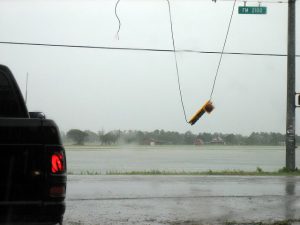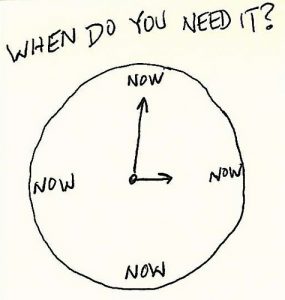Humor
Warning: Hacks for Hacks tips may have harmful side effects on your writing career, and should not be used by minors, adults, writers, poets, songwriters, scribes, scriveners, journalists, or anybody.
Due to circumstances surrounding Hurricane Florence, I will not be writing my “Hacks for Hacks” column this month. My family and I are quite safe, riding out the storm on a wooden raft in the middle of the Atlantic Ocean. As much as I would love to blame Mother Nature, which I do for the bulk of the problems in my life, I must accept full responsibility for not planning ahead and taking measures to deliver my column. I offer my humble apologies to Writer Unboxed and my readers.
In the interest of transparency and accountability, I catalogued the mistakes I made in the hope that you can avoid them yourself.
Mistake 1: Ignoring the weather report
Despite the fact that the news reports have been saying for the past week that a hurricane was approaching, through a combination of distracting websites, wishful thinking, snacks, and willpower, I remained unaware of this fact until the rains had begun. As I always say, never underestimate your ability to not notice an inconvenient fact when your sanity depends on you not noticing it. Had I been smart, I would have written and filed my column early in the week when Florence was still just a tropical storm.
Mistake 2: Selling my laptop for a handful of magic beans
When I finally did accept the fact that a storm was coming and that I very well could lose electricity, the life-giving substance that gives power to word processors and blogs alike, I took stock of the situation. I concluded that, given that my column is published on a blog, and that blogs live in “the cloud,” I could plant some magic beans to grow a giant beanstalk and climb up into the cloud myself. Once there, safely above the hurricane’s devastation, I could hand-deliver my column. Not only did I forget that I’d need my laptop to write the column (which is a pretty boneheaded move, I must admit), but the beanstalk only grew four stories tall, and was promptly blown over by the gale-force winds (another oversight for which I feel quite foolish).
Mistake 3: Trying to turn time backwards by driving my car in the opposite direction of the flow of traffic
Huge time waster, with nothing to show for it. In my defense, this would have worked if not for the roads being closed due to flooding, or if I had a jet ski.
Read MorePhoto by Nolan Issac on Unsplash
There are so many in-between phases in the writing life.
There’s the time before you begin writing a story, but have already felt the beginnings of a story simmering inside you.
The time between finishing a draft and revising it.
The time between finishing that draft and revising it yet again. (Repeat as necessary.)
The time between finishing a story and starting a new one.
What do you do with that in-between time? I’ve discovered this must be what non-writers call hobbies. Things that bring you joy, that you do purely for fun and pleasure. Which isn’t to say that writing is not something that brings me joy or that brings me pleasure…it’s just that I don’t quite see it as a hobby so much as a part of my life. Like breathing and reading.
I’m learning that the most nurturing hobbies for me are the ones that allow me to turn off my writer’s brain for a bit. Walking through my house the other day, I realized something.
Read Moreimage by Anthony Auston
It is a truth universally acknowledged that a writer whose latest post is scheduled to publish on Labor Day must, when considering topics, find herself muttering, “Well, shouldn’t I write something about work?”
And so, because there are many, many things to say about the work of writing, I put together a long list of short thoughts on the topic.
Warning: Hacks for Hacks tips may have harmful side effects on your writing career, and should not be used by minors, adults, writers, poets, scribes, scriveners, journalists, or anybody.
You’ve sat on the couch with your laptop for long enough. You’re a real writer, and you deserve a professional writing space of your own. A place where, by the mere act of sitting there, your brain engages into WORK MODE. A place where inspiration can find you. What makes desks so great for writing? Desks are renowned for their flatness, which makes them ideal for both computer-based and paper-based writing.
So what kind of desk do you need? As a writing-advice columnist and Famous Author, I am required to say here that the best desk is the one that you’re sitting at, so pretty much any desk will do—if you’re a conformist, mindless NORMIE, that is. C’mon, we’re going shopping.
Your options:
Talking with a group of aspiring writers recently, I was struck by how many of them felt like everyone in the publishing world was against them. “Why are agents so narrow-minded about what they want?” one asked. The frustration was nothing new — anyone who’s spent time talking to writers in person or on the internet knows frustration is the meat we feed on — but I was particularly uncomfortable with how much of the frustration was directed against individual people, rather than a system that can’t give all of us what we want all of the time.
So I thought I’d do a handy list of who and who isn’t your enemy in the publishing world. (Keeping a list of enemies isn’t something I generally recommend, for all sorts of reasons, but I think you’ll see how this one can be useful.)
OK, you’re asking, so if none of those people are arrayed against me, why am I so miserable? What’s keeping me down? Indeed, I have some thoughts on that front as well.
Read MoreWarning: Hacks for Hacks tips may have harmful side effects on your writing career, and should not be used by minors, adults, writers, poets, scribes, scriveners, journalists, or anybody.
Think of all the writers who have helped you out over the years: Your high school English teacher who saw promise in you when everyone else only saw the weird marginalia you drew in your notebooks. The published author who took the time to critique your early short stories. Your secret high-school crush who pretended they didn’t know about your notebook full of embarrassing love poems you wrote about them. All of these individuals made a positive impact in your writing career. Did they ever ask anything in return? Being a self-absorbed writer-type, you probably wouldn’t have noticed if they did. But now you’re the one in the position of power—maybe you’ve sold a short story or two; or perhaps you own more than one “Be nice to me or I’ll write you into my novel!” coffee mug. You couldn’t have achieved these successes without help along the way, and it’s your turn to pass that wisdom to the next generation of writers. Here are a few ideas:
Critique their Manuscript
We all need a helping hand with that first (or second, or third!) book. Look for a promising newbie writer in your circle and offer a thorough critique of their manuscript. Impart to them the lessons you’ve learned over the years—for example, if your protagonist visits a swimming pool in Act I, someone must get pushed into it during a party in Act III. When the newbie writer’s eyes go wide in astonishment that they never learned this in college, simply shrug and say you learned this at the School of Hard Knocks, which is famous for its pool parties.
Host Authors on Your Blog
Let other authors write guest posts on your blog to promote their books. This isn’t just a way to get free content for your blog. It’s also—oh, wow, I had you at “free content for your blog,” didn’t I? Well, that’s good enough for me. And hey, look who’s signed up to write an article? It’s your mentee whose manuscript you critiqued. Wow, paying it forward is paying off already!
Read MoreWarning: Hacks for Hacks tips may have harmful side effects on your writing career, and should not be used by minors, adults, writers, poets, scribes, scriveners, journalists, or anybody.
The rise of ebooks and podcasts, and the decline of attention spans and disposable income, have made this the perfect time for you to start writing serialized fiction. By releasing only bite-sized chunks of story, you can give readers just enough to sink their teeth into each week, while still leaving them hungry for more, like your favorite TV show but without the visual element, star power, budget, and major-network distribution.
Never written a serial before? Me neither! But I’ve written a column about how to write one, which you’re reading right now. Let’s go!
What’s all this, then?
What is serial fiction? Like all fictional narratives, a serial is a way to torture and humiliate your protagonist in public. But in serials, you do it on a weekly basis. If that sounds daunting, remember that, as a writer, you are by definition a walking bundle of anxieties and resentments, so have confidence that you can dish out that sort of punishment on the regular.
How do I structure a serial?
Focus on character. Your main character has to be someone you enjoy tormenting. In return for your season-long cycle of animus toward your protagonist, you have to dangle a payoff in front of them. You need to present the central conflict early on in the series/season/cycle/whatever you call it. You can’t start off with two prologues and nine chapters of backstory like you do in your epic fantasy series.
What’s the serial writing process like?
Serials are kinda like an episode of your favorite TV show, so learn to think like a TV writer! We’re in the golden age of television, so we have a lot to learn from those folks. For example, make sure to put a cliffhanger at the end of each episode. Remember to insert act breaks to allow for commercials. Deal with the fact that one of your lead actors got drunk and started a fistfight, and now you’ve got to write him off the show. That’s right, you now have to write backstories not just for your characters, but for the fictional actors portraying those characters. It’s getting all sorts of meta up in here.
To outline or not to outline? Do it however you like, but the beauty of serial fiction is that you only have to write a few thousand words each week. Do you really want to mess with your flow by having some boring blueprint you have to stick to? Just make it up as you go along, and if you get stuck on a particular scene, make that the end of the episode. That’s a problem for Future You to deal with. Honestly, Future You should be thanking you for providing the sort of impossible writing situation that triggers the levels of panic necessary to write something that’s just good enough that you get to repeat the process next week.
Read MoreWarning: Hacks for Hacks tips may have harmful side effects on your writing career, and should not be used by minors, adults, writers, poets, scribes, scriveners, journalists, or anybody.
Look at you, a writer on the go! Maybe you’re off to a convention for the weekend, or to a mountain cabin for a writers retreat. Wherever it is you’re going, you’ll need to to pack strategically to maximize your amount of fun and productivity. You’re probably thinking of packing your duffel with a bunch of socks and underwear and T-shirts or whatever. You fool. You think that’s going to be sufficient for your trip? You’re a writer, for God’s sake, and you need to pack like it.
The list:
Warning: Hacks for Hacks tips may have harmful side effects on your writing career, and should not be used by minors, adults, writers, poets, scribes, scriveners, journalists, or anybody.
We all love coffee shops as a place to get hopped up on caffeine, interact with fellow creatives, check up on social media, and maybe even write a page or two. Taking a few minutes to escape from the demands of family can be just what the doctor ordered, or at the very least, your lawyer. However, if you escape to the same place every time, you’ll soon develop a new set of ruts, which will lead to a new set of irritations, a new set of bad habits, and eventually, a new set of dirty looks from those around you. Get a change of scenery for your change of scenery by considering these inspirational writing spots.
A Bar
Like a coffee shop, except with alcohol. Yeah, it’s not that much different, but you’re easing into it. Baby steps.
A City Park
Find yourself a bench in a nearby park and write to your heart’s content. What better way to enjoy the outdoors than by doing something you could more easily do indoors? And you get to feel superior to all the folks out there exercising and socializing like chumps. Just be prepared for when the voice of your inner child shrieks that you’re wasting a beautiful day of unlimited recess by doing homework. You can tell your inner child that you’ve learned new and better ways to have fun, and now you have to get back to work to meet your deadline before your editor calls and yells at you again.
The Beach
Don’t worry about getting ocean water in your laptop. It’s the sand you’ve got to watch out for. At the beach, bring an old-fashioned notebook and pen and let the majesty of your surroundings pull words from your pen as easily as an undertow dragging a surfer to their doom. The sound of crashing waves will wash away the distractions from your mind, except for a maddeningly sweet song sung by several women sitting on a rocky outcropping just offshore. Hustle up and finish your daily word count so you can swim out to meet them!
Read MoreWarning: Hacks for Hacks tips may have harmful side effects on your writing career, and should not be used by minors, adults, writers, poets, scribes, scriveners, journalists, or anybody.
Sometime in your writing career, you’re going to be faced with a deadline you can’t meet. The best advice for dealing with this, of course, is to build up a decades-long reputation of professionalism and reliability ahead of time, proving that one missed deadline is a mere anomaly, like a Bigfoot sighting. That’s all well and good for smug pros who worry about things like reputation and getting paid, but we flakes and hacks need something more immediate that doesn’t require a time machine or a work ethic. That’s why I’ve put together this list of excuses guaranteed to get you out of a jam.
Important Note
These excuses are pretty much guaranteed to work, but don’t go nuts with them. Even the most gullible marks (henceforth referred to as “clients”) will get suspicious if you’re blowing deadlines week after week.
Each person is born with an allotment of fifteen minutes of fame, and every writer begins their career with 100 reputation points. This point balance will go up (supposedly) and down (most certainly) at various points of your career. Each excuse costs you a certain amount of reputation points, which you spend at your peril. Once your balance hits zero, people will stop hiring you. They’ll avert their eyes at parties, and start casually mentioning the younger, more talented, and more attractive writers they’re working with instead. Use your points wisely! Or failing that, have a really good pen name ready to go in case you have to change your name.
The List
Kid stuff (10 points): Whether there’s a snow day at school, or your kid was awake all night throwing up on the mattress, nobody worth working for will begrudge a parent taking care of their children. (This probably goes without saying, but I’m expecting you to lie about these things. Under no circumstances should you poison your child to make them sick, nor should you create some sort of evil weather-control device in your secret underground laboratory.)
Dead computer (15 points, multiplied by the number of times you’ve used this excuse): Dropbox makes this harder to get away with every year, but as of this writing, it still works. Just be very clear you’re emailing them from your phone when you tell them about it. Add in some autocorrect mishaps to make it lock more convivial.
Food poisoning (20 points): Alcohol is a food, kinda, so you’re not even really lying.
There’s an alligator sitting right next to your car, in which you left your laptop (30 points): This excuse is only valid only in Louisiana and Mississippi. In Florida, you’d be expected to wrestle it.
Read MoreI recently stumbled onto an online discussion about animated films, where somebody referred to The Lion King as having been inspired by Shakespeare’s classic play Hamlet. That was news to me, and it made me think about other films that I had belatedly learned were inspired by Shakespeare plays, such as 10 Things I Hate About You (The Taming of the Shrew) or My Own Private Idaho (Henry IV and Henry V).
This in turn got me thinking about how little I actually knew about Shakespeare. True confession: until about four months ago, my Shakespearian awareness was largely limited to a 1966 episode from season 3 of Gilligan’s Island, where the castaways perform a musical adaptation of Hamlet for a famous movie producer currently stranded on their island (hey, it could happen). Behold, in all its glory:
Boning up on the Bard
While I’ll admit that episode is fondly etched into my cultural DNA (yes, I’m deep), I realized I needed something more. After all, now that I am supposed to be a Serious Writer (said with the appropriately furrowed brow, and the sincere intent to someday purchase a tweed blazer with leather elbow patches), this scarcity of SSC (Shakespearian Street Cred) seemed inexcusable. So I took advantage of some recent time off from the DDG (dreaded day gig) to remedy this gap in my cultural literacy, and went off to my local library to load up on books and DVDs. I tend to be a total-immersion kind of guy when I develop a new interest, so the next several weeks were all Shakespeare, all the time. The results were illuminating. First, there was the fundamental question:
Just how big a deal is this guy?
Pretty darn big, as I was soon to learn. As literary critic and expert on all things Shakespearian Harold Bloom observes in the forward of Susannah Carson‘s book, Living with Shakespeare: Essays by Writers, Actors, and Directors, Shakespeare is “the most widely read author in English; his Complete Works are second in popularity only to the Bible.” (Take that, James Patterson! Suck it, Clive Cussler! But I digress…)
Okay, so the guy’s a best-seller. But Shakespeare’s impact is broader and more profound than the sheer size of his readership, as Bloom elaborates:
We live in Shakespeare’s world, which is to say that we live in a literary, theatrical, cultural, and even psychological world fine-tuned for us by Shakespeare. Had he never lived, we would have bumbled along well enough, but he did live, and he did write, and those works were printed, and read, and performed, and passed on, and read some more, and performed some more, and emulated, and assimilated, and quoted, and so on. So that now, four hundred years later, we continue to read and perform and emulate his work so thoroughly and passionately that it’s difficult to conceive who we would be – as a culture, as ourselves – had Shakespeare never existed.”
Those are some powerful claims, and worthy of further examination.
Read More





















